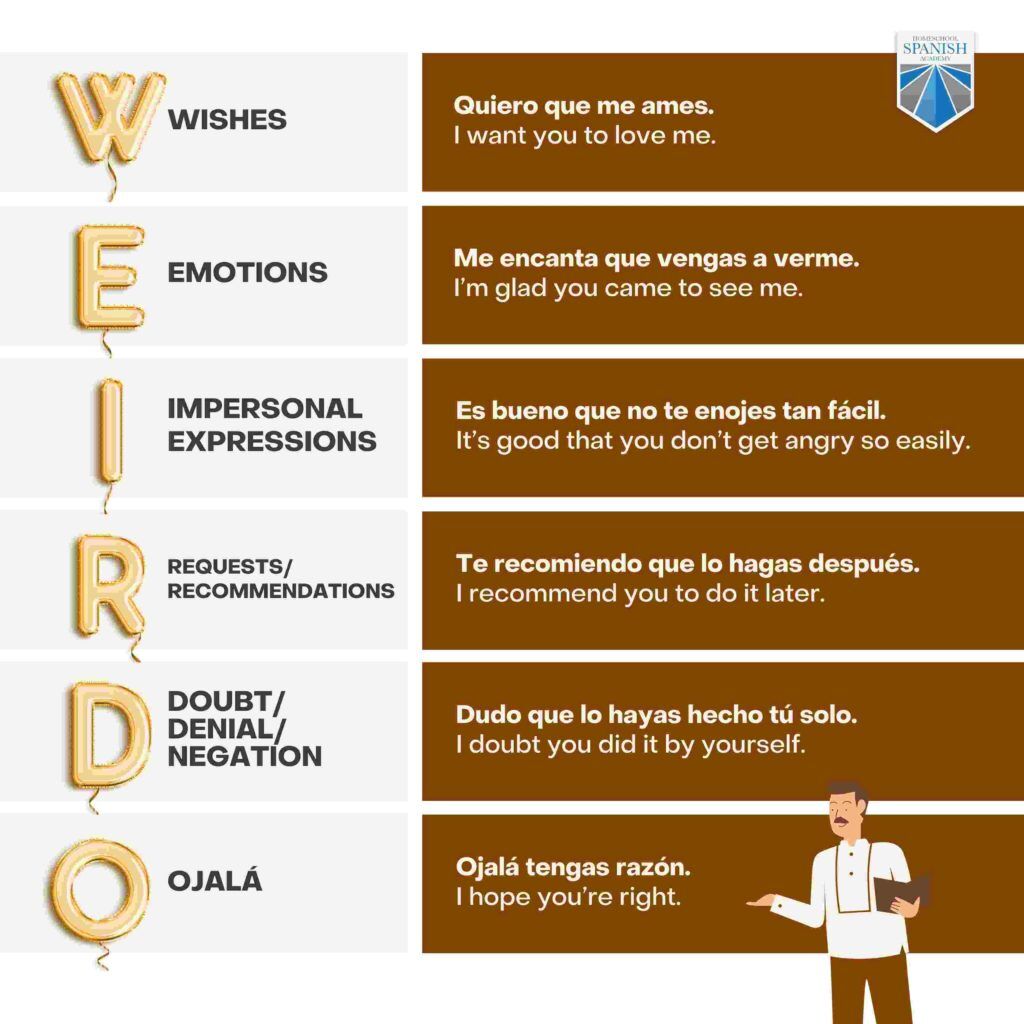
If you’ve been trying to figure out the Spanish subjunctive rules, you’ve probably come across the WEIRDO subjunctive acronym.
In fact, WEIRDO exists to help Spanish learners understand the subjunctive.
Keep reading to discover how understanding the WEIRDO subjunctive helps you master this important grammar topic. To prove your new knowledge, take the multiple-choice test at the end of this article!
If you’re reading this, you probably already know a bit about the subjunctive mood.
For detailed information about the subjunctive, check out:
Now, let’s review the key information about this mood before diving into the WEIRDO subjunctive.
1. The subjunctive is one of the three moods, and it conveys the uncertainty of the speaker about the things they’re saying.
Es posible que tengas razón.
It’s possible that you’re right.

2. You use it to talk about future events that may or may not happen.
Quiero que me leas un libro.
I want you to read me a book.
3. There must be two verbs in the sentence. The first one is in the indicative mood, and the other is in the subjunctive.
No creo que compren esa casa.
I don’t think they will buy that house.
4. A relative pronoun que (which, that) or quien (who, that) introduces the subjunctive clause.
Dudo que él sea quien lo haya hecho
I doubt that he is the one that has done it.
5. The verb in the main clause must be one of the WEIRDO verbs.
And now, let’s get to the heart of the matter.
WEIRDO is an acronym that designates the verbs that introduce the subjunctive mood. It’s a method that helps you remember six situations when you should use the subjunctive.
Wishes
Emotions
Impersonal expressions
Recommendations or requests
Doubt or denial and negation
Ojalá (hopefully)
 the verbs that introduce the subjunctive mood." width="500" height="500" />
the verbs that introduce the subjunctive mood." width="500" height="500" />
Let’s look at the WEIRDO verbs in detail—with examples to make it easier for you to understand and learn to use.
These verbs help you express what you want, wish for, and desire.
| English | Spanish |
| to ask for | pedir |
| to demand | exigir |
| to desire | desear |
| to hope | esperar |
| to insist | insistir |
| to need | necesitar |
| to want | querer |
Quisiera que no lo hicieras.
I’d like you not to do it.
Insisto en que lo leas.
I insist that you read it.
Espero que vengas pronto.
I hope you come soon.

WEIRDO emotion verbs cover all the verbs that express emotions, whether positive or negative.
| English | Spanish |
| to feel sorry | sentir |
| to get angry | enojarse |
| to love | encantar |
| to regret | lamentar |
| to rejoice | alegrarse |
| to surprise | sorprender |
Siento mucho que te haya pasado esto.
I’m so sorry this has happened to you.
Me encanta que le enseñes esto a tu hija.
I love that you’re teaching this to your daughter.
Me sorprende que todavía lo creas.
I’m surprised that you still believe it.

WEIRDO impersonal expressions use the following formula that triggers the subjunctive mood:
| English | Spanish |
| it’s easy to | es fácil que |
| it’s fantastic that | es fantástico que |
| it’s good that | es bueno que |
| it’s important that | es importante que |
| it’s incredible that | es incredible que |
| it’s necessary that | es necesario que |
| it’s strange that | es extraño que |
| it’s wonderful that | es maravilloso que |
Es fantástico que te hayas decidido.
It’s great that you’ve made up your mind.
Es increible que sigan pasando estas cosas.
It’s unbelievable that these things keep happening.
Es necesario que la llames.
You need to call her.

WEIRDO request and recommendation verbs require some kind of action or reaction from the person you’re talking to or about. Some of these verbs are similar in meaning to the WEIRDO wish verbs.
| English | Spanish |
| to advise | aconsejar |
| to ask | pedir |
| to insist | insistir |
| to order | ordenar |
| to order | mandar |
| to prefer | preferir |
| to recommend | recomedar |
| to require | requerir |
| to suggest | sugerir |
| to want | querer |
Te pido que no lo hagas.
I ask you not to do it.
Requiero que se me oiga.
I demand to be heard.
Quiero que te cambies.
I want you to change your clothes.

As you know, the subjunctive mood is all about uncertainty of the speaker regarding the message given. That’s why the verbs that express doubt and negation trigger the subjunctive in noun clauses.
| English | Spanish |
| to doubt | dudar |
| to not understand | no comprender |
| to not believe | no creer |
| to not be sure | no estar seguro |
| to not seem | no parecer |
| to not think | no pensar |
Dudo que tengas razón.
I doubt you’re right.
No creo que te pase lo mismo dos veces.
I don’t think the same thing would happen twice to you.
No estoy seguro de que tengas que inscribirte ahora mismo.
I’m not sure you need to sign up right now.
Ojalá is a Spanish word that comes from Arabic, and it means “may God (Allah) will it.” That’s why there’s a hidden subject (Allah) already included in this clause. It’s optional to follow ojalá with que.
Ojalá (que) pasemos el examen.
I hope that we pass the exam.
Ojalá (que) llueva pronto.
I hope that it rains soon.

Before you check out what you’ve learned here, let’s take the last look at the WEIRDO acronym.

Ready to learn more Spanish grammar? Check these out!
I'm a Spanish philologist, teacher, and freelance writer with a Master's degree in Humanities from Madrid. I speak Polish, Spanish, and English fluently, and want to get better in Portuguese and German. A lover of literature, and Mexican spicy cuisine, I've lived in Poland, Spain, and Mexico and I'm currently living and teaching in Madeira, Portugal.
Latest posts by Olga Put (see all)